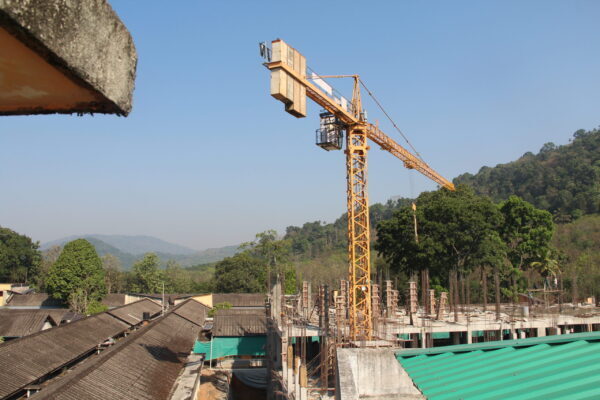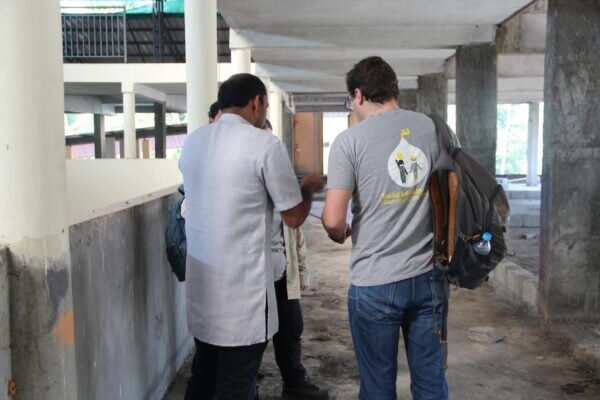
The value of getting involved in volunteering in social infrastructure in India
05 of May of 2023
When the Esperanza y Alegría Foundation decided to improve the facilities at the Mundakayam Medical Trust Hospital in India, we realized something: providing the new building with a quality water supply system was essential. This system had to guarantee access to this resource and respond to all their needs.
To do this, we had the collaboration, help, and support of Ferrovial. However, the company hasn’t limited itself to carrying out this project: the team has been so involved that several of its workers have traveled to India to see the situation of those who need and will use this hospital firsthand.
A volunteer program has allowed these workers to get involved in building the new facilities at the Mundakayam Medical Trust Hospital. This shows that volunteering makes it possible to leave an impression on people and bring real value to society.
Education, hope, and joy
The Esperanza y Alegría Foundation started in 2001, now 22 years ago. Today, it is active in 22 countries, carrying out projects where the main mission is education. It is our belief that, without education, there is no future, no hope or joy. Once you educate a person, you are educating their environment and giving them resources for betterment.
In addition to education, our projects focus on health, food, access to water, and the rights of women and children, among other areas. Our philosophy is inspired by the spiritual principles of Mother Teresa of Calcutta, and we aim to reach the most disadvantaged without discriminating on the basis of origin, belief, ethnicity, culture, race, or gender.
Today, with the years of experience we’ve gained, we’re carrying out many of our projects in Spain and in India. Some end up turning out to be self-sustainable, while others always depend on funds. Therefore, one of our main concerns is to ensure that they receive funding.
Maintaining these projects financially wouldn’t be possible without our partners, without the collaboration of responsible, committed entities, or without raising awareness. One of the ways we can bring these realities to the fore and raise awareness in society is through volunteering. We hold activities at our headquarters that are aimed at the corporate sphere.
We also do this on an international scale; these activities are carried out in places where the Foundation is executing projects, hand in hand with our local partner organizations. This was how several Ferrovial workers ended up traveling to the Kerala region of India to see the effect that the new hospital facilities were going to have on residents in the area.

The value of volunteering
It was especially important for us that the Ferrovial volunteers could see the project’s before and after. We wanted them to learn about the reality of people in Kerala and understand the extent to which improving the hospital can change their lives. This is the true value of a volunteer program.
I personally had the opportunity to volunteer from a very young age at college. Shortly after moving to New York to continue my studies at Columbia University, I noticed that something was missing. I was missing volunteering. I got involved in different projects, and that’s when I was lucky enough to meet Mother Teresa and learn about her philosophy.
Later on, I had the opportunity to travel to Latin America several times for work. On each trip, I visited a project and saw poverty again and again. Years later, my life took a turn when Father Gastón de Henar, a close friend of Mother Teresa’s, contacted me to ask for help. A great flood in the Ganges Delta had impacted many, many people, most of them so-called “untouchables.”
At that moment, I realized that, in order to have a real impact on the lives of these people, I had to do something more organized. I decided to create a foundation inspired by Mother Teresa’s spiritual principles for the poorest of the poor, with education as its central axis. That’s how my career, which started out with volunteering, led to the Esperanza y Alegría Foundation.

A hospital where there’s no water shortage
The Mundakayam Medical Trust Hospital is located in a very sweet, beautiful part of India that’s surrounded by mountains and rural towns. It’s a very poor area where there are very few opportunities. As is the case across India, this is a place of contrasts, where there are some incredibly wealthy people and other terribly poor people.
When the COVID-19 pandemic began, the Foundation went to offer humanitarian aid. We set up an ICU and sent medical supplies. This was all instinctive – at no time did we imagine the huge impact it would have. This measure saved many lives and totally changed the way the region’s inhabitants underwent the worst moments of the pandemic.
Then, Father Soji realized that the hospital didn’t have the necessary means to care for the population. A bigger facility was needed, so we got to work. Construction started a few months ago, and the first phase is expected to be done in November. At that time, it can go into use.
We presented the project to several entities, and Ferrovial took on the part related to water access. This is key because water is life, progress, health, and education. It’s everything. That’s why it is so important to develop the hydraulic aspect, which is based on a rainwater collection system, the construction of two underground reservoirs, and the installation of a water filtration, purification, and extraction system.
To carry out this and any project, money is important – and so is heart. That is why I am so grateful for how Ferrovial’s workers have gotten involved with this project, traveling to India to meet those who would actually benefit from the hospital. When both heart and soul are involved and there’s the understanding that there are people who need us in other parts of the world, everything changes.
As Mother Teresa of Calcutta said, “We know only too well that what we are doing is nothing more than a drop in the ocean. But if the drop were not there, the ocean would be missing something.” We at the Foundation need a lot of help to carry out projects like this in a satisfactory manner, both with volunteers and partners, however small they may be.
To me, Ferrovial is now a part of the Esperanza y Alegría Foundation, and the Esperanza y Alegría Foundation is already part of Ferrovial, thanks to the company’s involvement in this project.
In future posts, we will hear first-hand accounts of the experiences of workers who participated in this volunteer project.




There are no comments yet